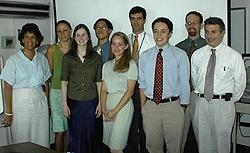
Under the new grant received from the Donald W. Reynolds Foundation, the Medical College curriculum will focus more attention on issues in geriatric medicine. This summer, seven Weill Cornell medical students participated in a summer research program in which they conducted individual research projects on various topics in geriatrics, which they presented at a forum at the Medical College on Aug. 9. The students are shown here with Dr. Ronald Adelman (far right), co-chief of the Division of Geriatrics and Gerontology, and Dr. Veronica LoFaso (far left), assistant professor of medicine.
Weill Cornell's educational program in geriatric medicine is gearing up for a significant expansion that will involve every stage of medical education—the four-year undergraduate curriculum, residency training, and CME programs for physicians.
This expansion in geriatric education is being supported by a $2 million grant from the Donald W. Reynolds Foundation, one of the largest private foundations in the U.S. (The Reynolds Foundation was established in 1954 by the late Mr. Reynolds, a media entrepreneur who founded the Donrey Media Group.)
"Weill Cornell has been a leader in addressing the special needs of older persons," said Dr. Mark Lachs, co-chief, with Dr. Ronald Adelman, of the Division of Geriatrics and Gerontology in the Department of Medicine. "Older age groups are the fastest-growing segment of our population, and physicians need the best training available to appropriately treat older persons and the age-related disorders that they may develop. This grant from the Reynolds Foundation will help to prepare more physicians to address this need."
The undergraduate curriculum for medical students will soon include a multiyear component in geriatric medicine. In the first two years, issues in geriatric medicine will be included in the case studies explored in the problem-based-learning (PBL) courses. In the third and fourth years, clinical clerkships will offer a geriatric component that will include training in a hospital setting, outpatient offices, nursing homes, and even some house calls at the patient's home.
Residency training in geriatrics will include a mandatory one-month rotation for all residents in the Department of Medicine. In addition, CME courses in geriatrics will be offered to physicians in the NewYork-Presbyterian Healthcare System (now numbering about 14,000) and other interested physicians.
Geriatric psychiatry, in which Weill Cornell is an acknowledged leader, will strengthen its programs to improve the ability of physicians to detect and treat depression, loneliness, dementia, and other mental-health problems among older age groups.
In addition, the Division of Geriatrics and Gerontology is developing innovative courses to improve the quality of life for older persons, such as courses in environmental design to make practical improvements in living spaces for older persons.
"These new initiatives will enable us to integrate geriatric medicine for all levels of trainees, and take geriatric education at Weill Cornell to new heights," said division co-chief Dr. Ronald Adelman.
Dr. Adelman is also director of the Irving Sherwood Wright Center on Aging, one of the leading ambulatory geriatric facilities in the city. A community facility established in 1998, the Wright Center is jointly operated by Weill Cornell and NewYork-Presbyterian Hospital in partnership with the Burden Center for the Aging, a social services agency, and ElderServe, a home-care services agency that is part of the Hebrew Home for the Aged in Riverdale. These organizations and the Wright Center are located at the same site on First Avenue between 77th and 78th Streets. The Wright Center is named for the late Dr. Wright, a pioneer in geriatric medicine and a longtime member of the Medical College faculty, who helped found and was first president of the American Federation for Aging Research.

